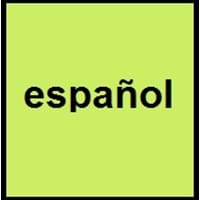Countries
Andora, Argentina, Aruba, Australia, Belize, Bolivia, Brazil, Canada, Chile, Colombia, Costa Rica, Cuba, Dominican Republic, Ecuador, El Salvador, Equatorial Guinea, France, Gibraltar, Guatemala, Honduras, Jamaica, Latvia, Luxembourg, Mexico, Morocco, Namibia, Netherlands Antilles, New Zealand, Nicaragua, Norway, Panama, Paraguay, Peru, Philippines, Puerto Rico, Russia, Spain, Sweden, Switzerland, Trinidad and Tobago, Turkey, United Kingdom, United States of America, Uruguay, Venezuela, Western Sahara
United States of America
National Language
Spain
United States of America
Second Language
Andora, Aruba, Australia, Austria, Belgium, Belize, Brazil, Bulgaria, Canada, Denmark, France, Germany, Ireland, Israel, Italy, Jamaica, Luxembourg, Morocco, Netherlands, Netherlands Antilles, New Zealand, Philippines, Poland, Portugal, Romania, Russia, Slovenia, Switzerland, Trinidad and Tobago, Turkey, United Kingdom, United States of America, US Virgin Islands
Not spoken in any of the countries
Speaking Continents
Africa, Asia, Europe, North America, South America
North America
Minority Language
Brazil, France, Germany, Italy, Japan, Morocco, United Kingdom
Not spoken in any of the countries
Regulated By
Asociación de Academias de la Lengua Española
Not Available
Interesting Facts
- One of the world's most phonetic language is Spanish.
- Up to the 18th century, Spanish was diplomatic language.
- Navajo language is tonal language, as it heavily relies on pitch to distinguish between similar words.
- Navajo ethinc group is 2nd largest Native American group.
Similar To
French Language
Apache Language
Derived From
Latin
Not Available
Alphabets in
Spanish-Alphabets.jpg#200
Navajo-Alphabets.jpg#200
Writing Direction
Left-To-Right, Horizontal
Not Available
Thank You
Gracias
Ahéhee'
How Are You?
Cómo estás?
Ąąʼ haʼíí baa naniná?
Good Night
Buenas Noches
Yá'át'ééh hiiłchi'į'
Good Evening
Bonne soirée
Yá'át'ééh ałní'íní
Good Afternoon
Buenas Tardes
Yá'át'ééh
Good Morning
Buenos Días
Yá'át'ééh abíní
Please
Por Favor
T'aa shoodi
Sorry
triste
Not available
I Love You
Te Quiero
Ayóó ánííníshí
Excuse Me
Discúlpeme
Shoohá
Dialect 1
Mexican Spanish
Navajo1
Where They Speak
Mexico
Arizona
How Many People Speak
Not Available
Dialect 2
Cuban Spanish
Navajo2
Where They Speak
Cuba
New Mexico
How Many People Speak
Not Available
Dialect 3
Puerto Rican Spanish
Navajo3
Where They Speak
Puerto Rico
Utah
How Many People Speak
Not Available
Speaking Population
Not Available
Second Language Speakers
Not Available
Native Name
Español
Diné Bizaad / Dinék'ehjí
Alternative Names
Castellano, Castilian, Español
Navaho
French Name
espagnol; castillan
navaho
German Name
Spanisch
Navajo-Sprache
Pronunciation
[espaˈɲol], [kasteˈʎano]
Not Available
Ethnicity
Not Available
Navajo people
Language Family
Indo-European Family
Dené–Yeniseian Family
Subgroup
Romance
Athapascan
Branch
Not Available
Not Available
Early Forms
Old Spanish and Spanish
No early forms
Standard Forms
Pluricentric Standard Spanish
Navajo
Language Position
Not Available
Signed Forms
Signed Spanish
Navajo Sign Language
Scope
Individual
Individual
ISO 639 6
Not Available
Not Available
Glottocode
stan1288
nava1243
Linguasphere
51-AAA-b
No data available
Language Type
Living
Living
Language Linguistic Typology
Subject-Object-Verb
Subject-Object-Verb
Language Morphological Typology
Fusional, Synthetic
Fusional, Polysynthetic, Synthetic
Spanish and Navajo Greetings
People around the world use different languages to interact with each other. Even if we cannot communicate fluently in any language, it will always be beneficial to know about some of the common greetings or phrases from that language. This is where Spanish and Navajo greetings helps you to understand basic phrases in Spanish and Navajo language. Spanish word for "Hello" is hola or Navajo word for "Thank You" is Ahéhee'. Find more of such common Spanish Greetings and Navajo Greetings. These greetings will help you to be more confident when conversing with natives that speak these languages.
Spanish vs Navajo Difficulty
The Spanish vs Navajo difficulty level basically depends on the number of Spanish Alphabets and Navajo Alphabets. Also the number of vowels and consonants in the language plays an important role in deciding the difficulty level of that language. The important points to be considered when we compare Spanish and Navajo are the origin, speaking countries, language family, different greetings, speaking population of these languages. Want to know in Spanish and Navajo, which language is harder to learn? Time required to learn Spanish is 24 weeks while to learn Navajo time required is 88 weeks.





